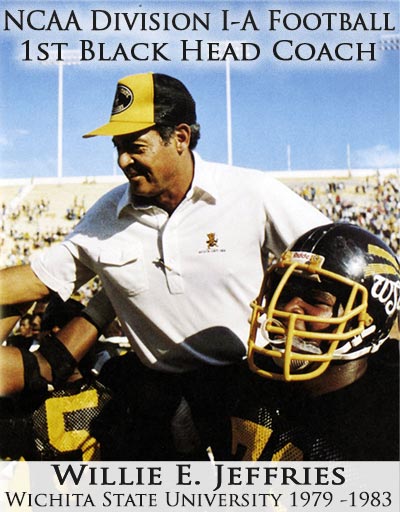
In 1979, Willie E. Jeffries became the first Black man hired as a head coach for an NCAA Division I-A football program, taking the job at Wichita State University (WSU). Jeffries served as the Shockers’ head coach for five seasons (‘79 through ’83), posting his best season in 1982, when the Shockers went 8 -3 and finished second in the Missouri Valley Conference.
Unfortunately, Willie Jeffries’ tenure at WSU became mired in controversy when the NCAA cited him and his coaching staff for numerous violations, including recruiting violations. As a result of the NCAA findings, Jeffries was terminated, and the WSU football program was placed on probation for the ’83 and ’84 seasons.
Three years after Jeffries’ firing, Wichita State University President Warren Armstrong announced the termination of the school’s football program at the end of the 1986 season.
Before his stint at WSU, Jeffries was a head coach at a historically black college/university (HBCU), South Carolina State University (’73 to ’78). After leaving Wichita State, Jeffries was hired at Howard University, where he served as their head coach from ’84 to ’88. Jeffries returned to South Carolina State in 1989, where he stayed until he finished his head coaching career in 2001.
Willie E. Jeffries was elected to the College Football Hall of Fame in 2010. During his distinguished 29-year career as a college head football coach, he was the first African-American head football coach at an NCAA Division IA program. He won three Black College Football National Championships at South Carolina State (’76, ’77, and ’94).
The Sports Highlights USA list of Black Head Football Coaches at NCAA Division I-A Schools is dedicated to Willie E Jeffries, all the Black pioneers who came before him, and all those who dare to lead the way into the future.
Black Head Football Coaching Changes at NCAA FBS Schools for 2025-2026
New Hires
- Charles Huff moved from Southern Mississippi to Memphis on December 6, 2025.
- JaMarcus Shephard was named the new head coach at Oregon State on November 28, 2025. Shephard previously served as Alabama’s co-offensive coordinator.
- James Franklin was appointed as Virginia Tech’s new head coach on November 17, 2025, just five weeks after his dismissal from Penn State.
FIRED or Resigned
- Sherrone Moore was fired at Michigan on December 10, 2025, as a result of an alleged inappropriate relationship with a staff member.
- Jay Norvell was fired at Colorado State on October 19, 2025.
- James Franklin is gone at Penn State: The reigning dean of Black head coaches at FBS programs was fired on October 12, 2025, after the pre-season No. 2-ranked Penn State Nittany Lions team lost three consecutive games after a 2-0 start. Franklin had been the head coach at Penn State for 11 seasons.
- DeShaun Foster was fired at UCLA on September 14. 2025, after a 0-3 start following his 5-7 debut record in 2024.
- Kenni Burns was fired at Kent State on April 11, 2025, due to contract violations, including misuse of a university purchasing card and violations of Ohio ethics laws related to a six-figure loan from a university vendor/booster.
Black Head Football Coaching Changes at NCAA FBS Schools for 2024-2025
New Hires
Black Head Coaching History In the Making
For the first time, a black head coach, Marcus Freeman, and Penn State’s James Franklin lead a team to an appearance at a College Football Playoff Game. Okay, the expansion from just four teams in 2014 to twelve in 2024-2025 helped things out a bit. But progress is progress, and I’ll take that. Even more so when you throw in the Bowl Championship Series that started in 1998. And, of course, before 1998, we only had the AP and Coaches poll to decide the NCAA Division I football champions.
Freeman’s Fighting Irish defeated Indiana 27-17 on December 20. Franklin’s Nittany Lions won their first game against SMU 38-10 on December 21.
Next up: Penn State takes on Boise State on New Year’s Eve, while Notre Dame battles the mighty Georgia Bulldogs on New Year’s Day.
Update: Penn State defeated Boise State 31-14, and Notre Dame defeated Georgia 23-10.
Click the following article to read about some of the historical barriers overcome in the making of this 2024-2025 College Football Playoff Semifinal matchup between Penn State and Notre Dame on January 9, 2025: Breaking the NCAA Color Barrier: Black Head Football Coaches Make History.
As of December 11, 2025, only 13 out of 136 NCAA FBS head coaches are Black. This represents 9.56% of all available head coach positions.
Studies from The Institute for Diversity and Ethics in Sports (TIDES), which serves as a comprehensive resource for issues related to gender and race in amateur, collegiate, and professional sports, show that approximately 54.3% of the student-athletes on NCAA FBS teams are African American (as of 2018). The latest interim U.S. Census data from 2015 estimates that Blacks represent 13.3% of America’s population. But you’re telling me that the representation of Black head coaches in the FBS can’t even match — let alone exceed — the U.S. Black population figures?
These figures are even more disturbing considering that the majority of NCAA FBS players are African American, and it has been so for nearly three decades.
For a more in-depth discussion of this topic, check out ESPN’s Ivan Maisel’s article, “The lack of Black college football coaches is still glaring, and so are the excuses behind it.”
NFL Black Head Coaches News
As of January 28, 2023, 7 of 32 NFL head coaches are Black, representing 21.9% of the league. According to 2022 NFL participation by race figures gathered by Statista, over 56% of its players identify as black, and only 24.9% identify as white. Another rather perplexing figure presented by Statista is that less than half of 1% of NFL players self-identify as Hispanic or Latino.
Kudos to the NFL owners who so far have hired three more Black head coaches in 2024. Progress!
- Mike Tomlin at Pittsburgh
- Todd Bowles at Tampa Bay
- DeMeco Ryans at Houston
- Mike McDaniel at Miami
- Raheem Morris at Atlanta
- Antonio Pierce at Las Vegas
- Jerod Mayo at New England
Last updated on December 7, 2025
List of Black Head Coaches at NCAA FBS (formerly Division IA) Schools
| # | Coach | School | Conference |
|---|---|---|---|
| 1. | Mike Locksley | Maryland | Big Ten |
| 2. | Thomas Hammock | Northern Illinois | MAC |
| 3. | Charles Huff | Memphis | AAC |
| 4. | Tony Elliot | Virginia | ACC |
| 5. | Marcus Freeman | Notre Dame | Independent |
| 6. | Deion Sanders | Colorado | Pac-12 |
| 7. | Lance Taylor | Western Michigan | MAC |
| 8. | Fran Brown | Syracuse | ACC |
| 9. | Derek Mason | Middle Tennessee State | USA |
| 10. | Willie Simmons | Florida International University | USA |
| 11. | Jerry Mack | Kennesaw State | USA |
| 12. | James Franklin | Virginia Tech | ACC |
| 13. | JaMarcus Shephard | Oregon State | Pac 12 |
Related Links:
Breaking the NCAA Color Barrier: Black Head Football Coaches Make History
2024-2025 NCAA FBS Head Coaching Changes

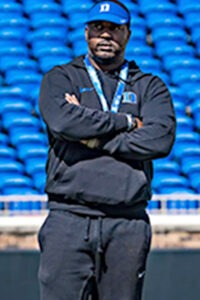
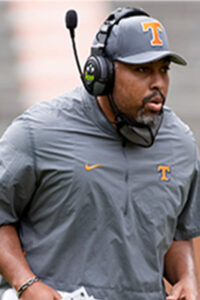
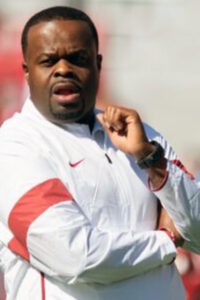
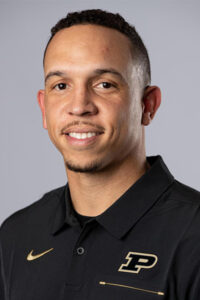
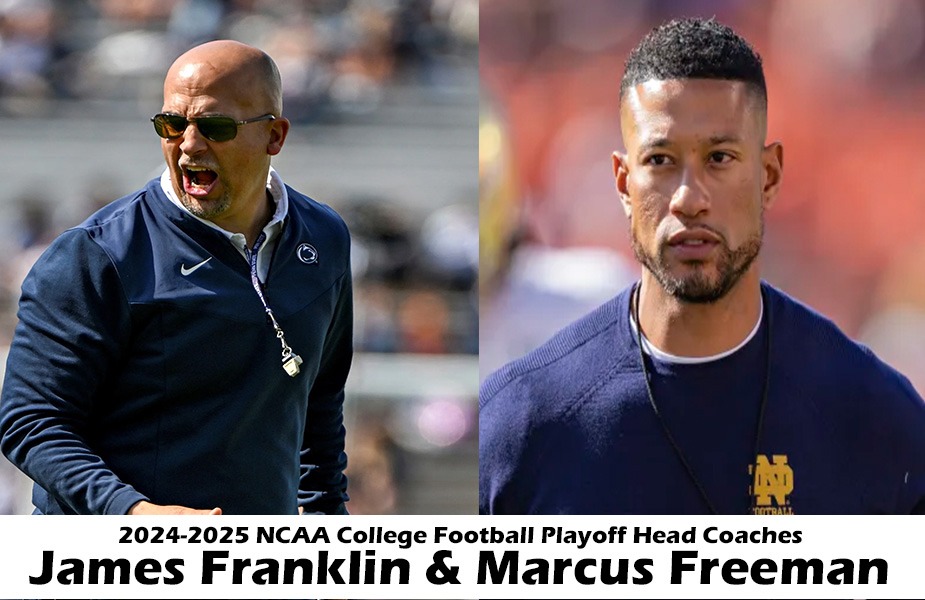
Beatlearl
December 22, 2024 @ 3:15 pm
Not a single SEC school,what a shocker with the history of that part of the country
Raymond
October 13, 2022 @ 1:12 pm
How did you find this info? Did you go through all 131 (D1) schools on wikipedia? Thanks!
Nkosi Narmer
October 14, 2022 @ 9:57 am
Wikipedia, huh?
Robert C. Johnson Jr
November 6, 2024 @ 6:38 pm
What about Georgia State head coach?
Mike
October 9, 2022 @ 3:27 am
It’s always amazing how Whites in comments want to find angles on Blacks who fail, yet won’t bring statistics of comparative White Counterparts. You wanna speak on now? Brian Harskin is barely hanging on at Auburn. Brent Venables at Oklahoma ain’t helping his cause. Chip Kelley after four years just got UCLA back to respectability. What White coaches secure in the SEC outside of 5 to 6 schools not UGA or Bama? What about the Big 12 or AAC and ACC. You’ll see 30 firings at seasons end and rest assure only ten percent will be AA coaches. The nature of the business is a beast. Stop being racist and claiming we BLACK FOLK blame other things. We’ve fought hard to get what you take for granted. That alone isn’t equality.
Nkosi Narmer
October 9, 2022 @ 11:16 am
Thanks, Mike. I agree.
The system of white supremacy in the United States barricaded African Americans from becoming head coaches at any major college until 1979. Until the 1950s, Black student-athletes weren’t allowed to compete at many major colleges in the northern states. Moreover, it wasn’t until 1967 that the first African American was allowed to play in an SEC football game. That’s because the under-the-table “Gentlemen’s Agreement” among colleges forbade all-white teams from competing against teams with Black players on the roster for decades.
Yes, we have made much progress: however, make no mistake—the system of white supremacy in America is still alive and kicking. You can see its vestiges along the sidelines and in the skyboxes at almost every college and pro football game.
The following is an online link to an excellent article about many of the first black players at major colleges and the racial barriers they had to overcome: The First Black Players at Major Colleges
Beau
September 21, 2022 @ 11:56 pm
Successful coaches, for example James Franklin (currently at Penn State, career Record: 12 Years, 94-49, .657 Win% at major schools) don’t use color as a crutch. It means nothing on the field. What matters are wins and losses.
Unfortunately, most of the coaches above have records closer to those of Marcus Freeman (currently at Notre Dame, career Record: 2 Years, 1-3, .250 Win% at major schools) or Mike Lockley (currently at Maryland, career Record: 8 Years, 18-49, .269 Win% at major schools) than Franklin.
Instead, just like Brian Flores in the NFL, or for that matter Black people everywhere, they always blame their shortcomings on someone else.
Playing football and coaching football are dramatically different tasks. One need not have played football or even played very well, or even have the skill to do so, to be a great coach. In fact, the world is full of them.
Examples of people that didn’t have great football skills but are great coaches: Nick Saban, Brian Kelly, Jimbo Fisher, James Franklin, Hugh Freeze, George O’Leary, David Cutcliffe, Dan Mullen, Sonny Dikes, Mike Leach.
Examples of people that played football but don’t have what it takes to coach: pretty much anyone that played football, especially in the NFL, but isn’t coaching on retirement.
So, if you want to make your argument, post your list of Black D1/FBS coaches and their winning percentages. Let’s see whether that average is over 50% or not at major schools.
Nkosi Narmer
September 22, 2022 @ 12:32 pm
Beau, Thanks for the comment. I’ve posted this running list of Black division 1 coaches since 2014 because I champion giving Black coaches the same opportunity to fail that white coaches receive–over and over again. And I should know because I also post a yearly list of all NCAA FBS hires and fires.
It’s truly unfortunate that college administrators still prefer– overwhelming–to give white coaches these opportunities. Furthermore, the fact remains that most division 1 hires fail. So when you want me to list winning percentages of Black NCAA FBS coaches, let’s also compare them to all the White FBS coaches who fail instead of you only listing the comparatively few successful ones.
I’ll give you this, there are and will continue to be many more Black coaches who fail than succeed. Like there are a lot more White coaches who fail than achieve. That’s simply the nature of the profession
Jay
May 8, 2023 @ 3:49 pm
I feel your argument. But let’s be completely transparent on this topic. How often does a black coach get a chance to get to the big schools? If he does get the job he’s given a short leash. Anyone that knows football knows it takes about 3-5 years for a head coach to get the team where he wants them to be. He has to get rid of some players that he feels doesn’t fit his criteria. He then has to recruit the type of players he wants to for his scheme and concepts. It doesn’t matter if he’s black or white, this is the time he needs. It’s impossible sometimes to turn things around in a year or two. Team hasn’t had a winning record in 10 years and now you hire me and want me to be the Messiah and raise your program from the ashes. And if I don’t do so in 2 years you wanna let me go